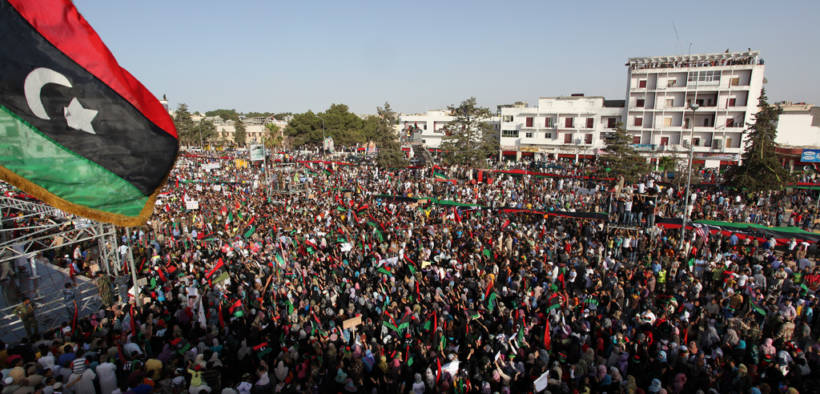The Battle For Libya: A New Frontline For Islamic Radicals

Libya’s political future has yet to be decided, but it will deeply impact Europe’s future and the battle against Islamic radicalism.
A stone’s throw away from Europe, Libya’s internal strife is ringing ever present in European officials’ ears, a stark reminder that our world has become smaller, and more importantly, that our western capitals are not immune to the fallout of foreign conflicts.
Libya’s battle for power could very much change Europe’s socio-political landscape through an explosion of radical narratives and ideologies. Let us not forget that every new Islamic radical raising his or her head towards the sun so far has been a far-right extremist – and though the two may be polar opposites, we cannot deny that they have somewhat needed one another to justify the expression of their respective politics and intolerance before others’ right to stand in their differences – may they be cultural, religious, political, sexual and everything else in between.
Radicalism is not a word reserved for the MENA region (Middle East and North Africa), very much like death does not discriminate and cares little about one’s skin color, faith or wealth. Rather it targets those communities left exposed to its attacks. To think ourselves above its grip would be to condemn ourselves to its insidiousness.
And though Libya’s political future has yet to be decided, it will inevitably define much of Europe’s future – insofar as our battle against Islamic radicalism plays out.
At the moment Libya has three centers of power: the Presidency Council (PC), the Government of National Salvation headed by Prime Minister Khalifa Ghwell and the authorities based in Tobruk and Bayda organized under the leadership of self-described anti-Islamist General Khalifa Haftar, who leads the Libyan National Army (LNA).
For all intents and purposes the Government of National Salvation has lost much of its relevance, pushed to the very fringe of power before the meteoric rise of General Haftar and the United Nations’ reluctance to recognize the dangers lurking under the umbrella of the Presidency Council.
It leaves us with Fayez Mustafa Al Sarraj, the chairman of the presidential council of Libya and prime minister of the Government of National Accord of Libya, formed on 17 December 2015 under the Libyan Political Agreement, and General Khalifa Haftar, a man made famous in Libya for his opposition to Islamic radicalism.
While Gen. Haftar’s popularity in Libya is somewhat tainted by his association to the former regime of Muammar Gaddafi and his subsequent alleged CIA collusion, many Libyan tribes have nevertheless chosen to back him on account of his rejection of Islamists.
While it would disingenuous to describe Al Sarraj as an Islamist sympathizer, the politician did call on the United Nations to help him push back against ISIS offshoots back in the summer of 2016, he has proven incapable of rallying enough support to its name to create any meaningful opposition to the rise of Islamism within Libya. Considering how serious the situation has become in relation to ISIS and ISIS’ desire to open yet another front to its global Jihad on Europe’s doorstep, to back the weaker party pretty much equates to enabling radicalism.
Today Libya has become a proxy for two opposing regional political forces – one dominated by Islamists dressed as moderates calling for international cooperation and monitoring to better legitimize their desire to return Libya to the Islamist fold, and the other inspired by the need to establish a strictly secular Libya so that all minorities could coexist, equal before the law to better break radicals’ push for control in North Africa.
You would assume of course that the United Nations and much of our western capitals would automatically and naturally support the latter – you would be wrong. As irony would have it, it is actually Saudi Arabia, the United Emirates, Egypt and Jordan which have stood by the one proponent for a secular democracy: General Khalifa Haftar while the United Nations chose to stand by Al Sarraj.
Could it be that Saudi Arabia, Egypt, Jordan, and the U.A.E drew from their past experience with Islamism while most western nations are playing catch up? I would argue here that Saudi Arabia and the U.A.E are in fact being responsible and foresighted. To give but an inch to the Muslim Brotherhood – the very power underwriting Libya’s move towards radicalism would be folly.
The simple fact that Turkey, the very seat of the Brotherhood, has been an advocate of Al Sarraj tells us that our best bet lies with Gen. Haftar, and thus with Riyadh and Abu Dhabi.
And yes, stranger things have happened.
The contrast between an Al Sarraj without his own forces and unable to really control his territory and a Haftar who, on the contrary, reunified the east of Libya and drove out the Islamists from the most important cities is one of the elements that most characterises Al Sarraj’s term of office.
So far two main accusations have been made against Fayez Al Sarraj both within Libya and abroad: one that he is unable to control the territory around the capital, forcing his government to use various militia groups all over Tripolitania and, two, that he has links to the Muslim Brotherhood – hence Turkey and Qatar’s willingness to support his mandate.
If the fight against ISIS in both Syria and Iraq are anything to go by, it is rather evident that our interest will be best served by those who advocate secularism and democracy over theo-authoritarianism, especially when sold as the moderate version of Islamism.








This is the most absurd column I have ever read. I wonder if the author is trying to push someone else’s agenda. Radical Islam, as it is practices today by ISIS and Al Qaeda was born in Saudi Arabia. The salafi strain of Islam promoted by Saudi Arabia and Bahrain through vast networks of madrassas is what created modern violent jihadi terrorism. The Muslim Brotherhood on the contrary opposes violence and believes in political and democratic participation. You may not like conservative religious parties, here or abroad, but to lump them in with violent jihadist who ridicule democracy is a very dishonest stretch. Lets remember, the Muslim Brotherhood in Tunisia is part of an internationally recognized governing coalition. In Morocco, they are active in politics and civil engagement. In Turkey, they have supported free market policies that quadruples the country’s economy in a decade. In Egypt, they won the election fair and square, only to have President Morsi overthrown by coup leader Gen Sisi, who was bankrolled by Saudi and UAE money. All the violence, over 900 people killed in one day, was against the Muslim Brotherhood, they were the victims. And then the author claims Gen. Haftar is “pro-democracy”? What world are you coming from? His main selling point is that democracy does not work and Libya needs another self imposed dictator like Qaddafi. He is Qaddafi reborn. All this article does is create a boogy man that does not exist in the garb of Islamisim.. and then tries to destroy it by undermining democracy. Leave it to the people of Libya to chose their own leaders. If Haftar was so popular, he would not need money, weapons, supplies and mercenaries from Russia, Saudi Arabia, Jordan, UAE, Sudan, Chad and others… while the legitimate government stands alone, supported only by the people it represents and Turkey as of late. Please, stop supporting two bit dictators, and support American values. Haftar is 76 and will probably die soon, does the author have any idea what the next phase holds? No, she is too busy bad mouthing the good guys.